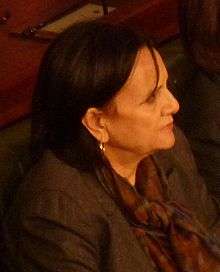Latifa Lakhdar
Latifa Lakhdar (born 1 February 1956) is a Tunisian historian and politician who was Minister of Culture from February 2015 until January 2016.

Early life and education
Lakhdar was born in Zarzis on 1 February 1956. She was a student of Mohamed Arkoun at the Sorbonne in Paris.[1]
Career
Lakhdar was Professor of Contemporary History at University of Ez-Zitouna from 1991 to 1999 and from 2000 to 2015 at the University of Tunis.[2]
Lakhdar is an expert in Islamic thought[3][4] and has published several books in Arabic and French, notably on the condition of women in Islamic societies.[1][2] She is a women's rights activist and secularist.[5] She has argued that Islamic fundamentalism, including Islamic terrorism is part of Islamic orthodoxy, but that Islamic thought can be enlightened and liberal if it undergoes a "critical revolution".[1] She argues that "The jihadist idea that religion should rule politics is a model that never existed."[4]
Political career
Lakhdar is a founding member of the Association tunisienne des femmes démocrates. In 2011, she was elected Vice-President of the Higher Authority for Realisation of the Objectives of the Revolution, Political Reform and Democratic Transition.[2][6]
On 6 February 2015, Lakhdar was appointed Minister of Culture and Heritage Preservation, as an independent, in the government of Prime Minister Habib Essid.[7] She was in communication with museum staff during the Bardo National Museum attack on 18 March 2015 and later unveiled a memorial at the site.[4]
On 12 February 2016, Lakhdar was made a Commander of the Order of the Republic by President Béji Caïd Essebsi for her service.[7]
Publications
Books
- Lakhdar, Latifa (1994). Confraternity Islam and the national question in colonial Tunisia (in French). Ceres.
- Lakhdar, Latifa (2002). The woman according to al-Ijma. Ceres.
- Lakhdar, Latifa (2007). Women in the Mirror of Islamic Orthodoxy (in French). Editions de l'Aube.
- Lakhdar, Latifa (2013). What will tomorrow be done? (in French).
Articles
- Lakhdar, Latifa (2001). "Orthodoxy and Fundamentalism: The Obstacles to a Modern Muslim Mindest". Il Regno.
- Lakhdar, Latifa (2003). "Les discours zitouniens, 1904–1932: entre la "la reproduction quasi-parfaite" et la "reproduction réinterprétatrice". Actes du XIe Colloque Internationale (in French). Tunis: Mannoube.
- Lakhdar, Latifa (2009). "Approche critique de las pensée islamique orthodoxe: contraintes et espoirs d'un chantier de recherche". In Pierre-Robert Baduel (ed.). Chantiers et défis de la recherche sur le Maghreb contemporain (in French). KARTHALA editions. pp. 571–588.
References
- Magister, Sandro (19 November 2002). "The Other Islam: Scholarly, and Written with a Sharp Pen". Chiesa. Retrieved 4 December 2016.
- "Qui est Latifa Lakhdhar, nouvelle ministre de la Culture?". Tekiano (in French). 24 January 2015. Retrieved 4 December 2016.
- Yéhia, Karem (15 April 2015). "Latifa Lakhdar : L'esprit critique tunisien va évoluer". Al-Ahram (in French). Retrieved 4 December 2016.
- Marlowe, Lara (24 March 2015). "Tunisian minister followed Bardo attack from 'crisis cell'". The Irish Times. Retrieved 4 December 2016.
- Moghadam, Valetine M. (2013). "What is democracy? Promises and perils of the Arab Spring". Current Sociology: 393–408.
- Moghadam, Valentine M.; Franzway, Suzanne; Fonow, Mary Margaret (2011). Making Globalization Work for Women: The Role of Social Rights and Trade Union Leadership. SUNY Press. p. 43.
- "Tunisie : Latifa Lakhdar décorée des insignes de commandeur de l'ordre de la République". Tekiano (in French). 12 February 2016. Retrieved 4 December 2016.